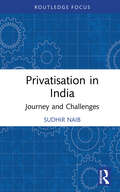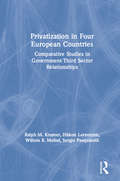- Table View
- List View
Private Wealth and Public Revenue in Latin America
by Tasha FairfieldHow and when can democracies tax economic elites? This book develops a theoretical framework that refines and integrates the classic concepts of business's instrumental (political) power and structural (investment) power to explain the scope and fate of tax initiatives targeting economic elites in Latin America after economic liberalization. In Chile, business's multiple sources of instrumental power, including cohesion and ties to right parties, kept substantial tax increases off the agenda. In Argentina, weaker business power facilitated significant reform, although specific sectors, including finance and agriculture, occasionally had instrumental and/or structural power to defend their interests. In Bolivia, popular mobilization occasionally counterbalanced the power of economic elites, who were much stronger than in Argentina but weaker than in Chile. The book's in-depth, medium-N case analysis and close attention to policy-making processes contribute insights on business power and prospects for redistribution in unequal democracies.
Private or Socialistic Forestry?: Forest Transition in Finland vs. Deforestation in the Tropics
by Matti Palo Erkki LehtoWhile deforestation continues at an alarming rate around the world, discussions on the range of underlying causes continue. The premise is that studying successful transitions from deforestation to sustainable forestry ex post in Finland can provide novel insights into how deforestation in the tropics might be reduced in the future. Our fundamental question here is why Finland succeeded to stop deforestation for a century ago and why not the same is feasible in the contemporary tropical countries? This book presents a novel integrated theory within which this case study on Finland and contemporary modeling of underlying causes of tropical deforestation are developed. Finland remains the world's second largest net exporter of forest products, while maintaining the highest forest cover in Europe. A transition from deforestation to sustainable industrial forestry took place in Finland during the first part of the 20th century. The underlying causes of this transition are compared via our theory with deforestation in 74 contemporary tropical countries. Both appear similar and support our theory. The interaction of public policies and market institutions has appeared to be critical during this transition. The study's findings suggest that private forest ownership with a continuous increase in the real value of forests and alleviation of poverty under non-corruptive conditions has been a necessary, but not a sufficient, condition for this transition. In a parallel way public policies have also proved to be a necessary, but not sufficient, condition in this transition. The conclusion is that socialistic forestry along with corruption is artificially maintaining too low values in the tropical forests. The opportunity cost of sustainable forestry remains too high and deforestation by extensification of agriculture therefore continues. The prevailing socialistic forestry with dominating public forest ownership is by purpose maintaining administratively set low stumpage prices leading to low value of forests, wide corruption and continuous forest degradation and deforestation. An effective remedy - to raise the value of forests - is found to be within forestry.
Private: Bradley Manning, WikiLeaks, and the Biggest Exposure of Official Secrets in American History
by Denver NicksBradley Manning perpetrated the biggest breach of military security in American history. This intelligence analyst leaked an astounding amount of classified information to WikiLeaks: classified combat videos and hundreds of thousands of documents from the wars in Afghanistan and Iraq and from embassies around the globe. Almost all of WikiLeaks's headline-making releases of information have come from one source only: Bradley Manning. The leaks affected governments the world over--the Arab uprisings were spurred, in part, by Manning's revelations. They propelled WikiLeaks to a level of international prominence it never had before. The world would never be the same. Bradley Manning's story is one of global significance, and yet he remains an enigma. Now, for the first time, the full truth will be told about a man who, at the age of only twenty-two, changed the world. Nicks's book paints a nuanced portrait of a man haunted by demons and driven by hope, impulsive and cocky yet idealistic enough to follow his conscience. Relying on numerous conversations with those who know Manning best, Nicks gives the full story of a bright, gay kid from middle America who signs on to serve his country and finds himself serving a cause he finds far more sinister, and why he betrayed his oath and fellow troops--and his own future--in order to fulfill what he saw as a higher purpose. Denver Nicks has written for The Daily Beast, The Nation, AlterNet, and other publications. He lives in New York City.
Private: The Royals (BookShots)
by James Patterson Rees JonesGod save the Queen-only Private can save the Royal Family.Private is the most elite detective agency in the world. But when kidnappers threaten to execute a Royal Family member in front of the Queen, Jack Morgan and his team have just 24 hours to stop them. Or heads will roll...literally. BookShotsLIGHTNING-FAST STORIES BY JAMES PATTERSON Novels you can devour in a few hours Impossible to stop reading All original content from James Patterson
Privateering and Diplomacy, 1793–1807: Great Britain, Denmark-Norway and the Question of Neutral Ports
by Atle L. WoldThis book addresses the British-Danish diplomatic debate on privateering and neutral ports in the period 1793-1807, when Denmark-Norway remained neutral in the war between Britain and France. The British government protested against the use French privateers made of Norwegian ports as bases for their attacks on the British Baltic Sea and Archangel Trades, but the Danish government insisted on keeping the ports open. This led to a running dispute on the relative rights and duties of belligerents and neutrals, but also on violations of the tentative agreement that the two governments reached in 1793. The three main chapters in the book address the principled debate on privateering and neutral ports; the central role played in the debate by the British diplomatic and consular representatives in Denmark-Norway; and privateering in practice. The final two chapters look at the impact of the Dutch change of sides in the war in 1795, and the development from the official closure of the Norwegian ports to privateers in 1799 until Denmark-Norway’s entry into the war on the side of France in 1807.
Privateers: The Stunning Sequel To Privateers (The Grand Tour #1)
by Ben BovaIn this “riveting account of the future,” America has ceded the heavens to the tyrants and the renegades—from the six-time Hugo Award–winning author (Wall Street Journal).The US has abandoned its quest for the stars, and an old enemy has moved in to fill the void. The potential wealth of the universe is now in malevolent hands. Rebel billionaire Dan Randolph—possessor of the largest privately-owned company in space—intends to weaken the stranglehold the new despotic masters of the solar system have on the lucrative ore industry. But when the mineral-rich asteroid he sets in orbit around the Earth is commandeered by the enemy, and his unarmed workers are slaughtered in cold blood, the course of Randolph’s life is changed forever.Now cataclysm is aimed at the exposed heart of America—a potential catastrophe that Randolph himself inadvertently set in motion. And the maverick entrepreneur must use his skills, cunning, and vast resources to strike out at his foes hard, fast and with ruthless precision—and wear proudly the mantle that fate thrust upon him: space pirate!“Swashbuckling action, a likeable—if macho—hero, and a down-to-the-wire plot.” —Library Journal“A solid, well-plotted tale that maintains a pleasing balance and tension between the politicking, the romancing, and the action-adventure. One of Bova’s best.” —Kirkus Reviews
Privatisation in India: Challenging economic orthodoxy (India in the Modern World)
by T.T. Ram MohanOver the past decade India has been undertaking a programme of economic reform, and at the same time the economy has been growing at a high rate. As part of the reform programme, and in line with prevailing economic thinking, India has been privatising its large, ungainly public sector. One assumption underlying this programme is the dogma that public sector enterprises are doomed to inefficiency, and that competitive market forces can be relied on to make firms more efficient once they are privatised. But is this really true? Combining rigorous data analysis with case studies to provide a balanced evaluation of the process of deregulation and privatisation within the overall context of economic reforms, the author demonstrates, remarkably, that, contrary to the prevailing view, private sector firms do not outperform public sector firms across all sectors. He also shows that revenue-raising considerations have weighed more heavily with the government than efficiency objectives. Overall, this study of the reform process in India, with its unique longstanding mix of private and public sectors, will be of great interest to all those studying reform and transition worldwide.
Privatisation in India: Journey and Challenges (Routledge Focus on Business and Management)
by Sudhir NaibThis book is a comprehensive work which incisively analyses, from a theoretically informed perspective, crucial aspects of India’s journey from partial divestiture to privatisation, accompanied by case studies of enterprises being privatised in FY 2022. Naib begins with the economic role of the state followed by theoretical and empirical evidence on the state versus private ownership in the first two chapters. Next, an overview of public sector in India including the New Public Sector Enterprise Policy for Atmanirbhar Bharat-2021 is discussed, before a broader examination of the global experience with privatisation is done. Naib then goes on to explore India’s journey from partial divestiture to privatisation from 1991 to 2021 in four time slots based on the political party in power. The book also looks at big ticket privatisation and asset monetisation proposed in FY 2022. Many criticised the design of National Monetisation Plan as it may lead to concentration of wealth, increasing inequalities, asset stripping, and consumers paying higher charges. The book closes by presenting six instances of big-ticket privatisations ranging from airlines, airports, banks, insurance, as well as industries such as petroleum and telecoms. The book’s timely data and analysis of key developments will interest researchers in the fields of divestiture and privatisation in India.
Privatisation in Ireland
by D�nal Palcic Eoin ReevesThis book analyzes privatization in Ireland, a European economy that has experienced rapidly changing fortunes over the last thirty years. It examines the effects of privatization in terms of corporate performance, public finances and the distributional aspects of privatization including the impact on employment and share ownership.
Privatised Law Reform: A History Of Patent Law Through Private Legislation, 1620-1907
by Phillip JohnsonIn the history of British patent law, the role of Parliament is often side-lined. This is largely due to the raft of failed or timid attempts at patent law reform. Yet there was another way of seeking change. By the end of the nineteenth century, private legislation had become a mechanism or testing ground for more general law reforms. The evolution of the law had essentially been privatised and was handled in the committee rooms in Westminster. This is known in relation to many great industrial movements such as the creating of railways, canals and roads, or political movements such as the powers and duties of local authorities, but it has thus far been largely ignored in the development of patent law. This book addresses this shortfall and examines how private legislation played an important role in the birth of modern patent law.
Privatisering in Pakistan: Uitdagingen en respons
by Shahid Hussain RajaZonder technische termen en geschreven in een gemakkelijk te lezen taal, is dit korte boek bedoeld voor algemeen lezerspubliek, met name voor degenen die moeten weten wat er gebeurt is met de privatiserings-inspanningen in Pakistan nadat de Pakistan Muslim League in 2013, een bedrijfsvriendelijk regime, aan de macht kwamen. Dit korte e-book is een uitgebreide versie van mijn artikel "Privatisering in Pakistan" dat ik schreef kort na mijn pensionering als Federaal Secretaris van de regering van Pakistan, ministerie van privatisering in 2012. Het trok veel aandacht, wat me ertoe aanzette een volwaardig boek te schrijven over de geschiedenis van privatisering in Pakistan en andere gerelateerde kwesties, inclusief de vooruitzichten en de uitdagingen waarmee het op korte tot middellange termijn zal geconfronteerd worden. Behoefte aan privatisering Over het algemeen heeft de staat een of meer van de volgende privatiseringsdoelstellingen; 1. versterking van de privé sector. Dit was de drijfveer achter de eerste generatie van privatiseringen die in 1960 in Pakistan werd uitgevoerd, toen de staat fabrieken bouwde in strategische sectoren en deze tegen zeer nominale tarieven overdroeg aan de zakenlieden die terughoudend waren om in deze sectoren te investeren vanwege een gebrek aan vereiste middelen tot hun beschikking en hoge risico's. 2. Verbetering van de efficiëntie en dienstverlening van staatsbedrijven, al dan niet winstgevend, door het stimulerings- en beloningsmechanisme in te voeren van de privé sector die kapitaal, technologie en betere beheerspraktijken zou inbrengen. Pakistan privatiseerde het grootste deel van zijn staatsbedrijven tijdens de privatisering van de tweede generatie in de jaren tachtig en negentig. 3. Elimineren / verminderen van de enorme overheidssubsidies die worden gegeven aan staatsbedrijven die voortdurend verliezen lijden, maar die niet kunnen worden gesloten vanweg
Privatising the Public University: The Case Of Law
by Margaret ThorntonFirst Published in 2011. Routledge is an imprint of Taylor & Francis, an informa company.
Privatización en Pakistán
by Shahid Hussain RajaAunque Pakistán haya estado llevando a cabo la privatización de empresas estatales por más de 50 años, la privatización de cualquier empresa siempre genera discusiones acaloradas, normalmente centradas alrededor de cuatro problemas/necesidades y beneficios, intereses de los empleados, bienestar del consumidor y transparencia. Mientras que sus autores lo apoyan por reducir subsidios estatales y lograr ganancias por eficiencia, sus adversarios se oponen por sacrificar bienestar público, “vender la plata familiar” (deshacerse de algo valioso en búsqueda de una ventaja, a pesar de que sea conveniente resguardarlo), y crear monopolios privados. Incluso aquellos, que son no partidistas en este debate, aconsejan precaución y argumentan que este proceso debería ser estrictamente evitado en el caso de monopolios naturales y de activos estratégicos como recursos naturales. Dejando de lado el debate, el hecho que la privatización es una parte integrante de la agenda general de la liberación y desregulación económica. Abriendo la economía a la competición, la liberación económica puede remover ineficiencias estructurales y falsas barreras creadas por el estado a la competencia. Eso es lo que se necesita y está pasando en Pakistán ahora. Este corto Libro digital es una versión ampliada de mi artículo “Privatización en Pakistán”, el cual escribí poco después de mi jubilación como secretario federal del Gobierno de Pakistán, Ministerio de Privatización en 2012. Atrajo un montón de atención y me impulsó a escribir un libro de pleno derecho sobre la historia de la privatización en Pakistán y otros problemas relacionados incluyendo sus porvenires y los desafíos que iba a enfrentar en el corto a mediano plazo.
Privatization In Bangladesh: Economic Transition In A Poor Country
by Clare E HumphreyBangladesh, the world's poorest large country, has privatized more state-owned industries than any other developing nation. This policy-orientated study traces Bangladesh's economic fortunes in its British, Pakistani and independent periods. Around the theme of a traditional society coping with modernization, the study analyzes in depth the effects
Privatization and Public Enterprises
by Richard Hemming Ali M. MansoorA report from the International Monetary Fund.
Privatization in Four European Countries: Comparative Studies in Government - Third Sector Relationships
by Ralph M. KramerThis book has a dual focus: on how four countries use voluntary non-profit organizations to provide services to the physically, mentally, and sensorially handicapped; and on the changing role of the voluntary, or "third," sector in welfare states. At the same time, it is also a comparative study of privatization in the special sense of using nongovernmental organizations to implement public policy. Most comparative studies of the welfare state have neglected this form of "indirect public administration" because researchers have usually conceived of government as monolithic and consequently overlook the frequent separation of financing from the delivery of public services.
Privatization in Malaysia: Regulation, Rent-Seeking and Policy Failure (Routledge Malaysian Studies Series)
by Jeff TanIn recent years, privatisation has fallen out of favour in many countries because the underlying political factors have not been well understood. This book examines Malaysia’s privatisation programme, focusing on how political constraints resulted in the failure of four major privatisations: the national sewerage company (IWK), Kuala Lumpur Light Rail Transit (LRT), national airline (MAS), and national car company (Proton). It considers why developing countries such as Malaysia might want to embark on privatisation, the factors that lead to policy failure, and what is needed to make it work. It shows clearly that political motives driving privatisation often dominate purely economic considerations, and thus it is necessary to analyse privatisation within the specific country context. It argues that failure in the Malaysian case was due to political considerations that compromised institutional design and regulatory enforcement, leading to problems associated with corruption. It concludes that privatisation does not necessarily improve incentives for efficiency or enhance the finance available for capital investment, and that successful privatisation depends on the state’s institutional and political capacity to design and manage an appropriate set of subsidies. Overall, this book is a comprehensive examination of privatisation in Malaysia, providing important insights for understanding the political economy of this process in other developing countries.
Privatization in Transition Countries
by Donal Mcgettigan Oleh HavrylyshynThe authors' view is that any privatisation is better than none, regardless of whether a stable, competitive environment has been established first. However, private companies started from scratch perform best, followed by newly privatised firms run by outsiders, either local or foreign. Privatised companies dominated by insiders do less well, but even they regularly outperform state enterprises. Without an appropriate market environment though, managers may spend more time lobbying the government for support than undertaking painful restructuring measures.
Privatization of Early Childhood Education and Care in Nordic Countries (Palgrave Studies in Third Sector Research)
by Karl Henrik Sivesind Håkon Solbu Trætteberg Maiju Paananen Steinunn HrafnsdóttirThis book explores the increasing role of private providers in early childhood education and care (ECEC) as they become a core part of the Nordic welfare model—one that once rejected for-profit involvement in public welfare. Within this context, ECEC has become the key battleground over private providers’ role in the welfare system. Chapters compare five Nordic countries: Iceland, Finland, Denmark, Sweden, and Norway, to discuss possible benefits from having different types of providers—public, nonprofit, and for-profit—in the welfare mix. To conclude, the authors also provide a comparative perspective on governance of the ECEC sector and on the development and functions of the Nordic welfare model.
Privatization: An International Review Of Performance
by Graeme HodgeContracting out public sector services and divesting public enterprises are reforms that have enjoyed widespread global popularity in recent years. Better services, lower prices and greater accountability are the promises made by politicians, senior executives, and investment companies when functions are moved from the public sector to private enterprise. But in Privatization, Graeme A. Hodge challenges these assumptions. Through an examination of hundreds of international studies on the performance of privatization activities, Hodge demonstrates that privatizing public services is often not the guaranteed panacea portrayed by its political supporters. Importantly, privatization activities can lead to modest gains, but there are also winners and losers in this reform. It therefore deserves far more care and balanced debate than it usually attracts.
Privatization: NOMOS LX (NOMOS - American Society for Political and Legal Philosophy #29)
by Melissa SchwartzbergA distinguished group of scholars explore the moral values and political consequences of privatization The 21st century has seen a proliferation of privatization across industries in the United States, from security and the military to public transportation and infrastructure. In shifting control from the state to private actors, do we weaken or strengthen structures of governance? Do state-owned enterprises promise to be more equal and fair than their privately-owned rivals? What role can accountability measures play in mediating the effects of privatization; and what role does coercion play in the state governance and control? In this latest installment from the NOMOS series, an interdisciplinary group of distinguished scholars in political science, law, and philosophy examine the moral and political consequences of transferring state-provided or state-owned goods and services to the private sector. The essays consider how we should evaluate the decision to privatize, both with respect to the quality of outcomes that might be produced, and in terms of the effects of privatization on the core values underlying democratic decision-making. Privatization also affects the structure of governance in a variety of important ways, and these essays evaluate the consequences of privatization on the state. Privatization sheds new light on these highly salient questions of contemporary political life and institutional design.
Privatização no Paquistão: desafios e resposta
by Shahid Hussain Raja Gisely GanozaEste pequeno EBook é uma versão expandida do meu artigo "Privatização no Paquistão", que eu escrevi logo depois da minha aposentadoria como Secretário Federal do Governo do Paquistão, Ministério da Privatização em 2012. Sua publicação atraiu muita atenção, me pedindo que escrevesse um documento completo, um livro sobre a história da privatização no Paquistão e outras questões relacionadas, incluindo suas perspectivas e os desafios que enfrentará em curto e médio prazo. Desprovido de termos técnicos e escrito em um idioma fácil de ler, este pequeno livro é para leitores em geral, particularmente para aqueles que precisam saber o que está acontecendo com os esforços de privatização do Paquistão depois de entrar no poder um regime favorável às empresas, a Liga Muçulmana do Paquistão, em 2013.
Privatizing China: Socialism from Afar
by Aihwa Ong Li ZhangEveryday life in China is increasingly shaped by a novel mix of neoliberal and socialist elements, of individual choices and state objectives. This combination of self-determination and socialism from afar has incited profound changes in the ways individuals think and act in different spheres of society. Covering a vast range of daily life--from homeowner organizations and the users of Internet cafes to self-directed professionals and informed consumers--the essays in Privatizing China create a compelling picture of the burgeoning awareness of self-governing within the postsocialist context. The introduction by Aihwa Ong and Li Zhang presents assemblage as a concept for studying China as a unique postsocialist society created through interactions with global forms. The authors conduct their ethnographic fieldwork in a spectrum of domains--family, community, real estate, business, taxation, politics, labor, health, professions, religion, and consumption--that are infiltrated by new techniques of the self and yet also regulated by broader socialist norms. Privatizing China gives readers a grounded, fine-grained intimacy with the variety and complexity of everyday conduct in China's turbulent transformation.
Privatizing Malaysia: Rents, Rhetoric, Realities
by Jomo K SIn this first critical, multidisciplinary assessment of recent privatization in a developing country, the contributors offer valuable lessons for the comparative study of denationalization and related public policy options. After an introductory survey, the volume presents broad perspectives on the context, formulation, and adjustment of privatization policy in Malaysia. The contributors review the distributional implications of specific privatizations for the public interest as well as for consumer and employee welfare. The book concludes with an examination of the economic, political, and cultural impacts of the privatization of physical infrastructure, telecommunications, and television programming.
Privatizing Poland: Baby Food, Big Business and the Remaking of Labor
by Elizabeth C. DunnThis book examines the effects privatization has on workers' self-concepts; how changes in "person-hood" relate to economic and political transitions; and how globalization and foreign capital investment affect Eastern Europe's integration into the world economy.






















